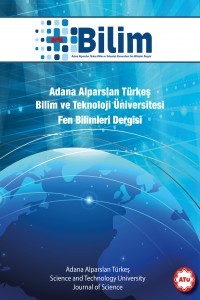Farklı kurutma metotlarının kömür öğütülebilirliği üzerine etkilerinin araştırılması
Kömürlerin öğütülebilirliğini; nem oranı, petrografik birleşimi, sertlik, kırılabilirlik ve yaşı gibi faktörler etkilemektedir. Ön ısıtma işlemine tabi tutulan kömürlerin öğütülebilirlikleri olumlu yönde etkilenmekte ve boyut küçültme işlemlerini kolaylaştırabileceği bilinmektedir. Bu çalışmada geleneksel kurutma yöntemleri (sabit ısıtmalı fanlı hava sirkülasyonlu etüv, havada kurutma) ile mikrodalgada kurutmanın kömürün öğütülebilirliğine olan etkileri ve ilişkileri araştırılmıştır. Bu amaçla iki farklı linyit kömürü; Tufanbeyli ve Ilgın linyit kömürleri seçilmiştir. Araştırma parametreleri olarak; kurutma tipi, kurutma sıcaklığı, kurutma süresi bağımsız değişkenler olarak seçilmiştir. Aynı koşullarda çubuklu değirmende öğütülmüş kömür numunelerin tane boyu dağılımları; d50 ve d80 değerleri ise bağımlı değişken olarak kabul edilmiştir. Yapılan deneysel çalışmalara göre havada kurutma ve etüvde kurutma metodu ile gerçekleştirilen deneylerin sonucuna kıyasla mikrodalga kurutma yöntemi uygulanan linyit kömürlerinin öğütülmesi daha kolay olduğu ve kurutmanın kömür öğütülebilirliğini bir dereceye kadar artırdığı saptanmıştır.
Anahtar Kelimeler:
Kömür kurutma, Öğütülebilirlik, Linyit, Mikrodalga enerji
Investigation of the effects of different drying methods on coal grindability
Some factors affect the coal grindability such as moisture content, petrographic composition, hardness, fragility and rank of the coals. The grindability of the pre-heated coal is assumed to be positively affected and facilitates size reduction processes. In this study, effects and relationship of traditional drying methods (air circulated fan oven and air drying) and microwave drying on the grindability of coals were investigated. For this purpose, two different lignite coals; Tufanbeyli and Ilgın lignite coals were selected. The research parameters; drying method, drying temperature, drying time were selected as independent variables. The particle size distributions of ground coal samples in a rod mill, under the same conditions were determined. The particle size distribution, d50 and d80 values of the ground coals were considered as dependent variables. As a result of the experimental studies, it was found that lignite coal grinding was easier with microwave drying compared to the results of experiments with air drying and oven drying and drying increases the coal grindability with some extend.
Keywords:
Coal drying, Grindability, Lignite, Microwave energy,
___
- [1] Marland, S., Han, B., Merchant, A., & Rowson, N. (2000). The effect of microwave radiation on coal grindability. Fuel, 79(11), 1283-1288.
- [2] Uslu, T., Atalay, Ü., & Arol, A. I. (2003). Effect of microwave heating on magnetic separation of pyrite. Colloids and Surfaces A: Physicochemical and Engineering Aspects, 225(1-3), 161-167.
- [3] Eskibalcı, M. F. (2007). Cevher hazırlama ve zenginleştirmede mikrodalga enerjisinin kullanılabilirliğinin araştırılması. İstanbul Üniversitesi, Maden Mühendisligi Anabilim Dalı, Doktora Tezi.
- [4] Özbayoğlu, G., Depci, T., & Ataman, N. (2009). Effect of microwave radiation on coal flotation. Energy Sources, Part A, 31(6), 492-499.
- [5] Hacifazlioğlu, H. (2014). Zonguldak Şlam Kömürünün Kurutulmasında Mikrodalga ve Konvansiyonel Fırının Verimliliklerinin Karşılaştırılması. Türkiye 19. Kömür Kongresi, Zonguldak, Türkiye, ss.291-301.
- [6] Tosun, Y. İ. (2015). Microwave activated crushing and grinding of turkish coals and shale for cleaning and desulfurization.
- [7] Couch, G. R. (1995). Power from coal-where to remove impurities?.
- [8] Conroy, A. (1991). Grinding behaviour of hard coals. Combustion News;(Australia).
- [9] Mishra, S. K., & Klimpel, R. R. (1987). Fine coal processing.
- [10] Cloke, M., & Lester, E. (1994). Characterization of coals for combustion using petrographic analysis: a review. Fuel, 73(3), 315-320.
- [11] Lytle, J., Choi, N., & Prisbrey, K. (1992). Influence of preheating on grindability of coal. International journal of mineral processing, 36(1-2), 107-112.
- [12] Bullinger, C. W., & Sarunac, N. (2010). Lignite Fuel Enhancement-Final Technical Report. Award No. DE-FC26-04NT41763.
- [13] Stnadish, N., Yu, A. B., & Azahari, H. L. (1993). Grindability of Indonesian coals. Publications of the Australasian Institute of Mining and Metallurgy, 3(93), 1347-56.
- [14] ASTM D3302-15, Standard Test Method for Total Moisture in Coal.
- [15] ASTM D3174-12, Standard Test Method for Ash in the Analysis Sample of Coal and Coke from Coal.
- [16] ASTM D3175-11, Standard Test Method for Volatile Matter in the Analysis Sample of Coal and Coke.
- [17] ASTM D4239-14, Standard Test Method for Sulfur in the Analysis Sample of Coal and Coke Using High-Temperature Tube Furnace Combustion.
- [18] ASTM D5865-13, Standard Test Method for Gross Calorific Value of Coal and Coke.
- [19] ISO 1928, Determination of gross calorific value by the bomb calorimetric method and calculation of net calorific value.
- Yayın Aralığı: Yılda 2 Sayı
- Başlangıç: 2018
- Yayıncı: Adana Alparslan Türkeş Bilim ve Teknoloji Üniversitesi
Sayıdaki Diğer Makaleler
Farklı kurutma metotlarının kömür öğütülebilirliği üzerine etkilerinin araştırılması
Burçin KAYMAKOĞLU, Osman SİVRİKAYA
Sakinşehir kavramının kent kimliğinin sürdürülebilirliğine katkısı
Fotovoltaik modüllerde yüzey sıcaklığının modül verimliliğine etkisi
Tünel stabilitesinin kısa ve uzun dönem parametreleri ile değelendirilmesi
